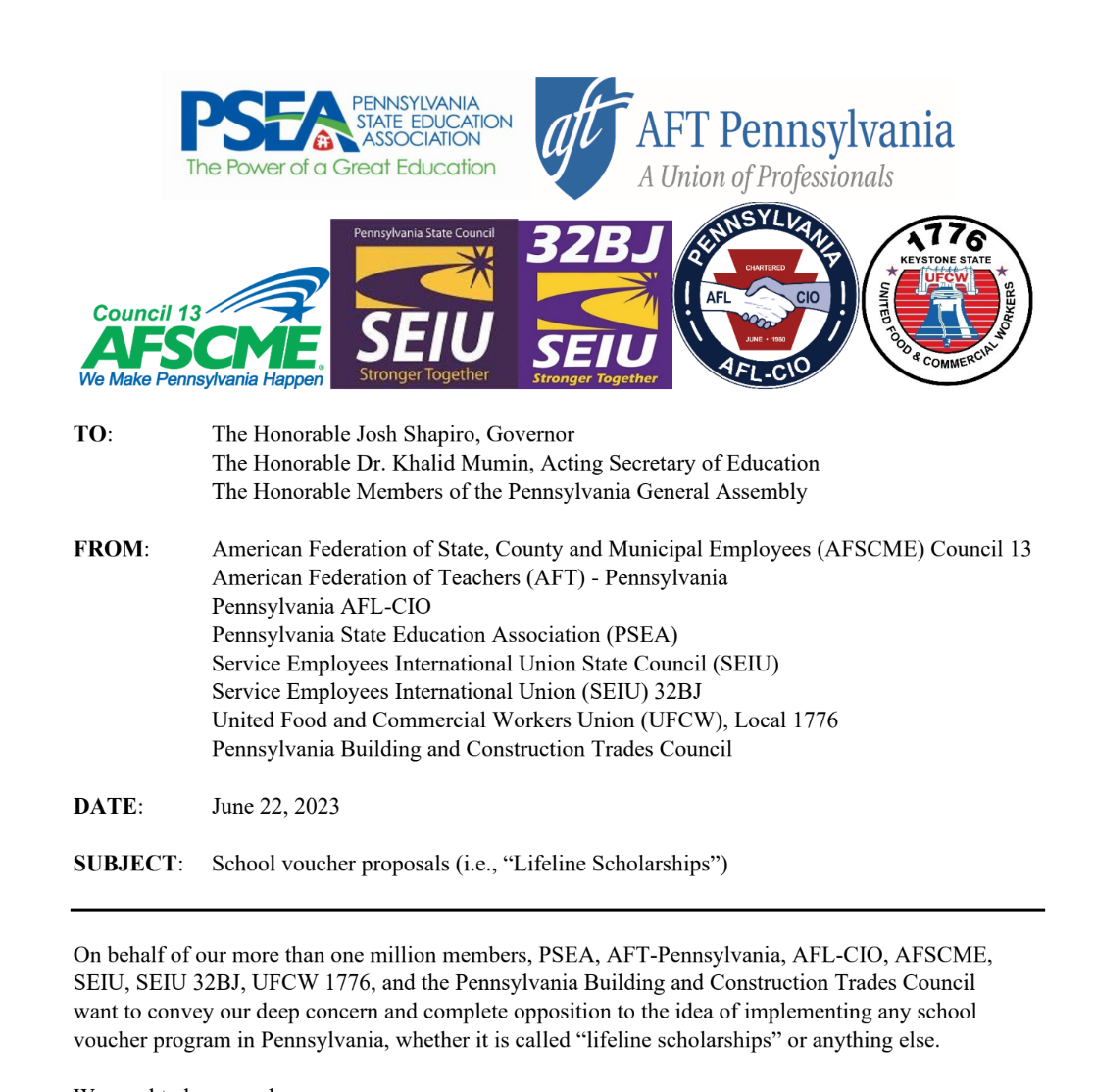ALL RESOURCES
FILTER BY TAG
Select a tag
- Academic performance
- Accessibility
- Accountability
- Advocacy
- Advocates
- Article
- Bill analysis
- Bill tracker
- Billionaires
- Blog post
- Civil rights
- Coalition building
- Community Schools
- Cost impact analysis
- Dark Money
- Data
- Disability
- Discrimination
- Drain funds from public education
- Education Savings Account (ESA)
- English language learners
- Fact sheet
- Fraud Waste and Abuse
- Graphic
- History
- Indigenous and Native Education
- Integration
- LGBTQ+
- Legislation
- Letter
- Litigation
- Messaging or talking points
- Model legislation
- National Voucher
- News
- Parents
- Personal narrative
- Podcast
- Policy brief
- Policymakers
- Radio
- Referendum
- Religion
- Report
- Rural communities
- Segregation
- Separation of church and state
- Slide deck
- Slides
- State Constitutional Right to Education
FILTER BY AUTHOR
Select an author
- Aaron Sanderford
- Alec MacGillis
- Allen Pratt
- Associated Press
- Bob Peterson
- Bruce Schreiner
- Catherine Caruso
- David Montgomery
- David Pepper
- Eli Hager
- Emily Walkenhorst
- Ethan Dewitt
- Geoff Mulvihill
- Hilary Wething
- Howard Fischer
- Jason Bailey
- Jessica Corbett
- Jim Collier
- Joe Dana
- Joshua Cowen
- Juan Perez Jr.
- Kiera Butler
- Laura Pappano
- Liam Amick
- Maurice Cunnningham
- Nora De La Cour
- Paige Masten
- Patrick Darrington
- Paul Hammel
- Phil Williams
- Rob Boston
- Robert Huber
- Rowan Moore Geretsy
- Sasha Pudelski

Telling the Real Story on School Voucher Programs Rapid Response Memo
Opponents of public schools have pushed forward with another attack on children’s freedom to learn. This time, some elected officials are threatening to rip funds from students via school voucher programs to bankroll private schools for the wealthy and hide their refusal to fully fund public schools and ensure that every child from the big cities to small towns has a neighborhood school where they can learn, grow and thrive.

Every Child Graphic
The Parents' Campaign Research and Education Fund Mississippi Constitution Graphic

Mississippi Constitution Graphic
The Parents' Campaign Research and Education Fund Mississippi Constitution Graphic

Fund what works: Public dollars for public schools
Regardless of race, neighborhood, or how much money is in their parents’ bank account, every child should be able to attend an excellent school that has everything they need to learn and grow. Every dollar spent on vouchers makes this vision less achievable. Vouchers take public money and give it to private schools, with real consequences for the 90% of our kids who attend Ohio's public schools.

Mississippi Constitution: No Public Funds for Private Schools
The Mississippi Constitution is clear: taxpayer dollars may not be appropriated for private schools.
The authors of the State Constitution understood that strong public schools are unique in their contribution to the wellbeing of our communities and our state – and that the greatest threat to this vital common good is the siphoning of public funds to subsidize the private education of a few, creating a system of unequal schools that would divide and weaken our state.

Vouchers and Public Benefits in the Budget
These slides from Policy Matters Ohio show how the Ohio budget funds school voucher programs compared to other public benefit programs.

State of Ohio Schools 2023
Ohio's students deserve a world-class education, including safe and well-resourced schools that are staffed with teachers who are well trained and fairly paid. Providing that education is our shared responsibility, and we all share its benefits as well: Every family does better when the next generation is prepared for the future, every community is enhanced when its young people are engaged, curious and active participants, and every boss wants a highly qualified hiring pool.
However, the combined effects of the COVID pandemic and Ohio’s legacy of inadequate, inequitable funding have weakened the role school plays as a foundational public institution. Ohio ranks 21st in the nation for K-12 education, 46th for equitable distribution of funding, and 40th in starting teacher salaries. Ohio public schools educate 1.7 million students across racial, gender, socioeconomic and geographic lines — and every one of them deserves better.

Funding Ohio’s Future
School is a place where childhood happens. Ohio’s public educators teach children of all races and backgrounds basic skills, but also challenge and inspire them to follow their dreams. For many students, school is a safe place to learn, develop and grow.
Ohio currently educates 1.6 million children attending school in our cities, suburbs and small towns. For years, almost no one was happy about how the state of Ohio funded public schools. The system pitted communities against each other and private and charter schools against public schools. We were living in the K-12 version of the “Hunger Games”: The wealthier your district, the stronger your chances of success.

Litigation Public Funds Public Schools
Private school voucher programs raise a number of legal issues, and many have faced court challenges. Voucher programs may violate a state constitution's education clause, including a state's obligation to adequately fund public schools or to provide a uniform system of public schools, and other important state constitutional protections.
Voucher lawsuits have also been based on violations of the First Amendment to the U.S. Constitution as well as state constitutional provisions, known as Blaine Amendments or no-aid clauses, that prohibit public funding of religious institutions. Other voucher lawsuits have focused on students' civil rights guarantees.

The Cost of Universal Vouchers: Three Factors to Consider in Analyzing Fiscal Impacts of CS/HB 1
The Florida House PreK-12 Appropriations Subcommittee offered a proposed committee substitute (PCS) to HB1 that included a fiscal analysis estimating the universal private education voucher bill will cost $209.6 million in year one for Florida Empowerment Scholarship (FES) vouchers. As of February 24, the PCS is now the new version of HB1, CS/HB1. Why is the fiscal analysis price tag so much smaller than the $4 billion estimate provided by Florida Policy Institute (FPI) and Education Law Center (ELC)? Because the FPI/ELC estimates follow a set of key assumptions that were not considered in the House’s fiscal analysis.

Testimony on HB 33
As advocates for sustainable and equitable opportunities for all Ohioans regardless of their ZIP code or what they look like, we believe that protecting public schools and providing a strong education is the foundation of a functioning democracy. Some of the proposals in House Bill 33 would strengthen that foundation. Others would undermine it.

Testimony on SB 11
As advocates for sustainable and equitable opportunities for all Ohioans regardless of their zip code or what they look like, we believe that protecting public schools and providing a strong education is the foundation of a functioning democracy. Senate Bill 11 would weaken that foundation.

Tell NC Lawmakers: Time to Deliver the Funding Our Children are Owed!
While the Leandro plan remains unfunded, legislators are proposing another round of income tax cuts for the wealthy and a massive expansion of the current private school voucher programs. These programs will disproportionately benefit wealthy families while hampering opportunities for families living in poverty.

Joint Letter re “Lifeline Scholarship” Proposal
The Education Law Center-PA, PSEA, AFT-Pennsylvania, AFL-CIO, AFSCME, SEIU, SEIU 32BJ, UFCW 1776, and the Pennsylvania Building and Construction Trades Council on behalf of their members wrote a letter to the Shapiro administration conveying deep concern and complete opposition to the idea of implementing any school voucher program in Pennsylvania, whether it is called “lifeline scholarships” or anything else

Preferencing Educational Choice: The Constitutional Limits
Rapidly expanding charter and voucher programs are establishing a new education paradigm in which access to traditional public schools is no longer guaranteed. In some areas, charter and voucher programs are on a trajectory to phase out traditional public schools altogether. This Article argues that this trend and its effects violate the constitutional right to public education embedded in all fifty state constitutions.
